Entrepreneurship and Small Business Management - A Detailed Report
VerifiedAdded on 2023/01/19
|15
|4195
|28
Report
AI Summary
This report provides an overview of entrepreneurship and small business management, examining various entrepreneurial ventures, their similarities and differences, and their impact on the economy. It assesses the role of micro and small businesses in economic development, particularly in the context of the UK, and explores their contribution to social economy growth. The report also identifies key characteristics and skills of successful entrepreneurs, using examples like William Henry Gates and Henry Ford, and considers how background and experience can influence entrepreneurial performance. Furthermore, the report references the importance of innovation, employment generation, and the development of personal relationships in fostering successful small businesses and start-ups, ultimately emphasizing their crucial role in societal and economic advancement. Desklib provides this and many other solved assignments.

Entrepreneurship
and Small Business
Management
and Small Business
Management
Paraphrase This Document
Need a fresh take? Get an instant paraphrase of this document with our AI Paraphraser
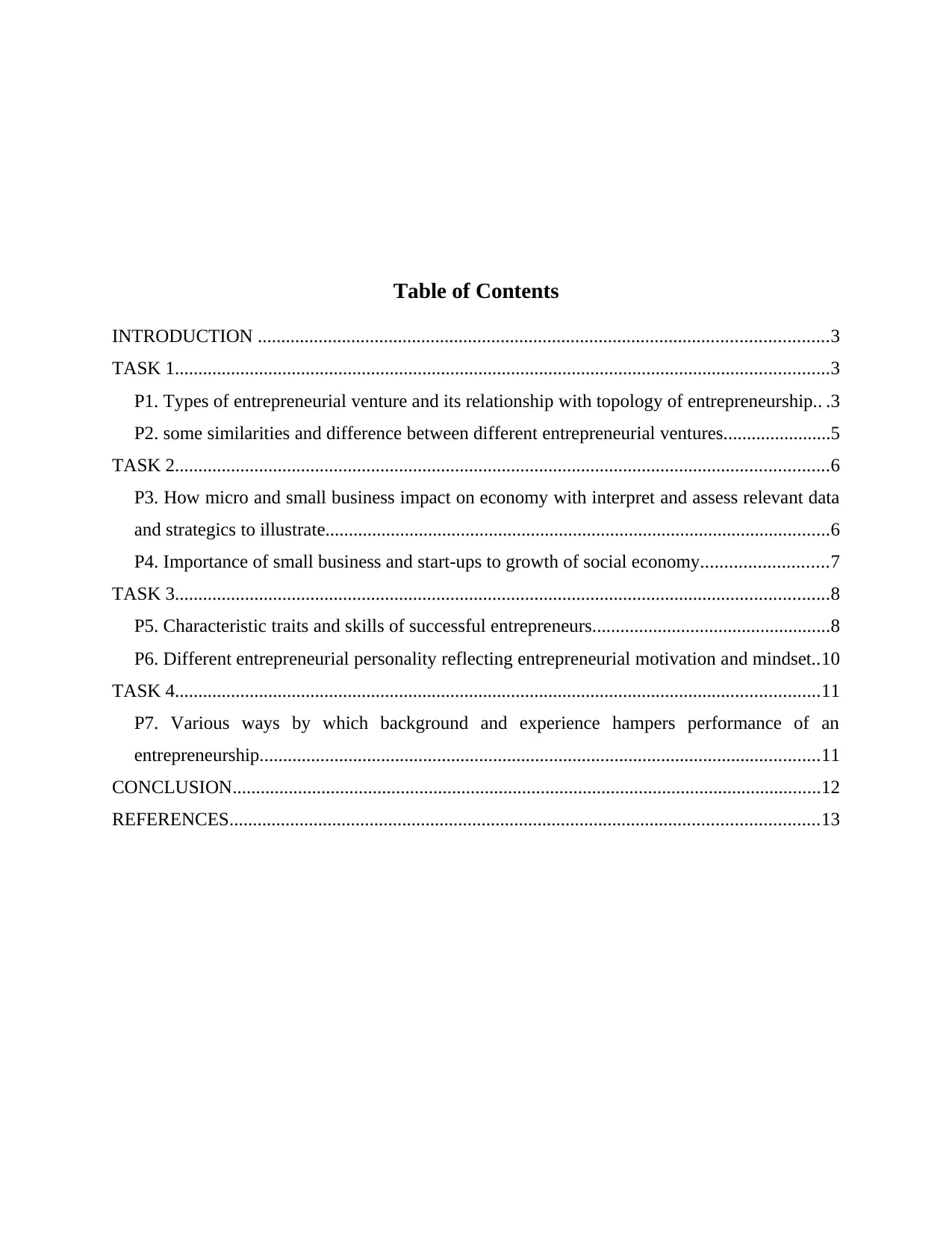
Table of Contents
INTRODUCTION ..........................................................................................................................3
TASK 1............................................................................................................................................3
P1. Types of entrepreneurial venture and its relationship with topology of entrepreneurship.. .3
P2. some similarities and difference between different entrepreneurial ventures.......................5
TASK 2............................................................................................................................................6
P3. How micro and small business impact on economy with interpret and assess relevant data
and strategics to illustrate............................................................................................................6
P4. Importance of small business and start-ups to growth of social economy...........................7
TASK 3............................................................................................................................................8
P5. Characteristic traits and skills of successful entrepreneurs...................................................8
P6. Different entrepreneurial personality reflecting entrepreneurial motivation and mindset..10
TASK 4..........................................................................................................................................11
P7. Various ways by which background and experience hampers performance of an
entrepreneurship........................................................................................................................11
CONCLUSION..............................................................................................................................12
REFERENCES..............................................................................................................................13
INTRODUCTION ..........................................................................................................................3
TASK 1............................................................................................................................................3
P1. Types of entrepreneurial venture and its relationship with topology of entrepreneurship.. .3
P2. some similarities and difference between different entrepreneurial ventures.......................5
TASK 2............................................................................................................................................6
P3. How micro and small business impact on economy with interpret and assess relevant data
and strategics to illustrate............................................................................................................6
P4. Importance of small business and start-ups to growth of social economy...........................7
TASK 3............................................................................................................................................8
P5. Characteristic traits and skills of successful entrepreneurs...................................................8
P6. Different entrepreneurial personality reflecting entrepreneurial motivation and mindset..10
TASK 4..........................................................................................................................................11
P7. Various ways by which background and experience hampers performance of an
entrepreneurship........................................................................................................................11
CONCLUSION..............................................................................................................................12
REFERENCES..............................................................................................................................13
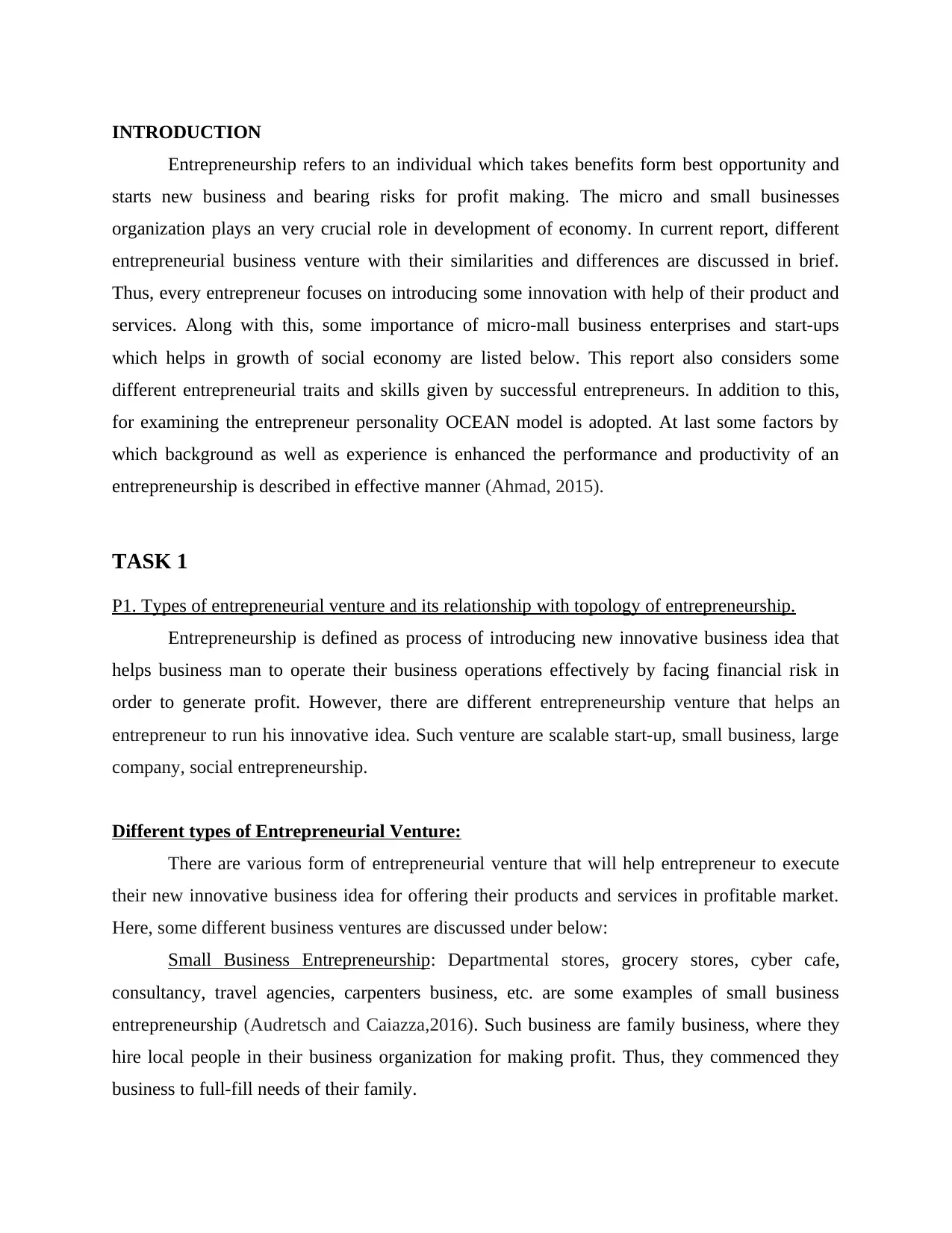
INTRODUCTION
Entrepreneurship refers to an individual which takes benefits form best opportunity and
starts new business and bearing risks for profit making. The micro and small businesses
organization plays an very crucial role in development of economy. In current report, different
entrepreneurial business venture with their similarities and differences are discussed in brief.
Thus, every entrepreneur focuses on introducing some innovation with help of their product and
services. Along with this, some importance of micro-mall business enterprises and start-ups
which helps in growth of social economy are listed below. This report also considers some
different entrepreneurial traits and skills given by successful entrepreneurs. In addition to this,
for examining the entrepreneur personality OCEAN model is adopted. At last some factors by
which background as well as experience is enhanced the performance and productivity of an
entrepreneurship is described in effective manner (Ahmad, 2015).
TASK 1
P1. Types of entrepreneurial venture and its relationship with topology of entrepreneurship.
Entrepreneurship is defined as process of introducing new innovative business idea that
helps business man to operate their business operations effectively by facing financial risk in
order to generate profit. However, there are different entrepreneurship venture that helps an
entrepreneur to run his innovative idea. Such venture are scalable start-up, small business, large
company, social entrepreneurship.
Different types of Entrepreneurial Venture:
There are various form of entrepreneurial venture that will help entrepreneur to execute
their new innovative business idea for offering their products and services in profitable market.
Here, some different business ventures are discussed under below:
Small Business Entrepreneurship: Departmental stores, grocery stores, cyber cafe,
consultancy, travel agencies, carpenters business, etc. are some examples of small business
entrepreneurship (Audretsch and Caiazza,2016). Such business are family business, where they
hire local people in their business organization for making profit. Thus, they commenced they
business to full-fill needs of their family.
Entrepreneurship refers to an individual which takes benefits form best opportunity and
starts new business and bearing risks for profit making. The micro and small businesses
organization plays an very crucial role in development of economy. In current report, different
entrepreneurial business venture with their similarities and differences are discussed in brief.
Thus, every entrepreneur focuses on introducing some innovation with help of their product and
services. Along with this, some importance of micro-mall business enterprises and start-ups
which helps in growth of social economy are listed below. This report also considers some
different entrepreneurial traits and skills given by successful entrepreneurs. In addition to this,
for examining the entrepreneur personality OCEAN model is adopted. At last some factors by
which background as well as experience is enhanced the performance and productivity of an
entrepreneurship is described in effective manner (Ahmad, 2015).
TASK 1
P1. Types of entrepreneurial venture and its relationship with topology of entrepreneurship.
Entrepreneurship is defined as process of introducing new innovative business idea that
helps business man to operate their business operations effectively by facing financial risk in
order to generate profit. However, there are different entrepreneurship venture that helps an
entrepreneur to run his innovative idea. Such venture are scalable start-up, small business, large
company, social entrepreneurship.
Different types of Entrepreneurial Venture:
There are various form of entrepreneurial venture that will help entrepreneur to execute
their new innovative business idea for offering their products and services in profitable market.
Here, some different business ventures are discussed under below:
Small Business Entrepreneurship: Departmental stores, grocery stores, cyber cafe,
consultancy, travel agencies, carpenters business, etc. are some examples of small business
entrepreneurship (Audretsch and Caiazza,2016). Such business are family business, where they
hire local people in their business organization for making profit. Thus, they commenced they
business to full-fill needs of their family.
⊘ This is a preview!⊘
Do you want full access?
Subscribe today to unlock all pages.

Trusted by 1+ million students worldwide
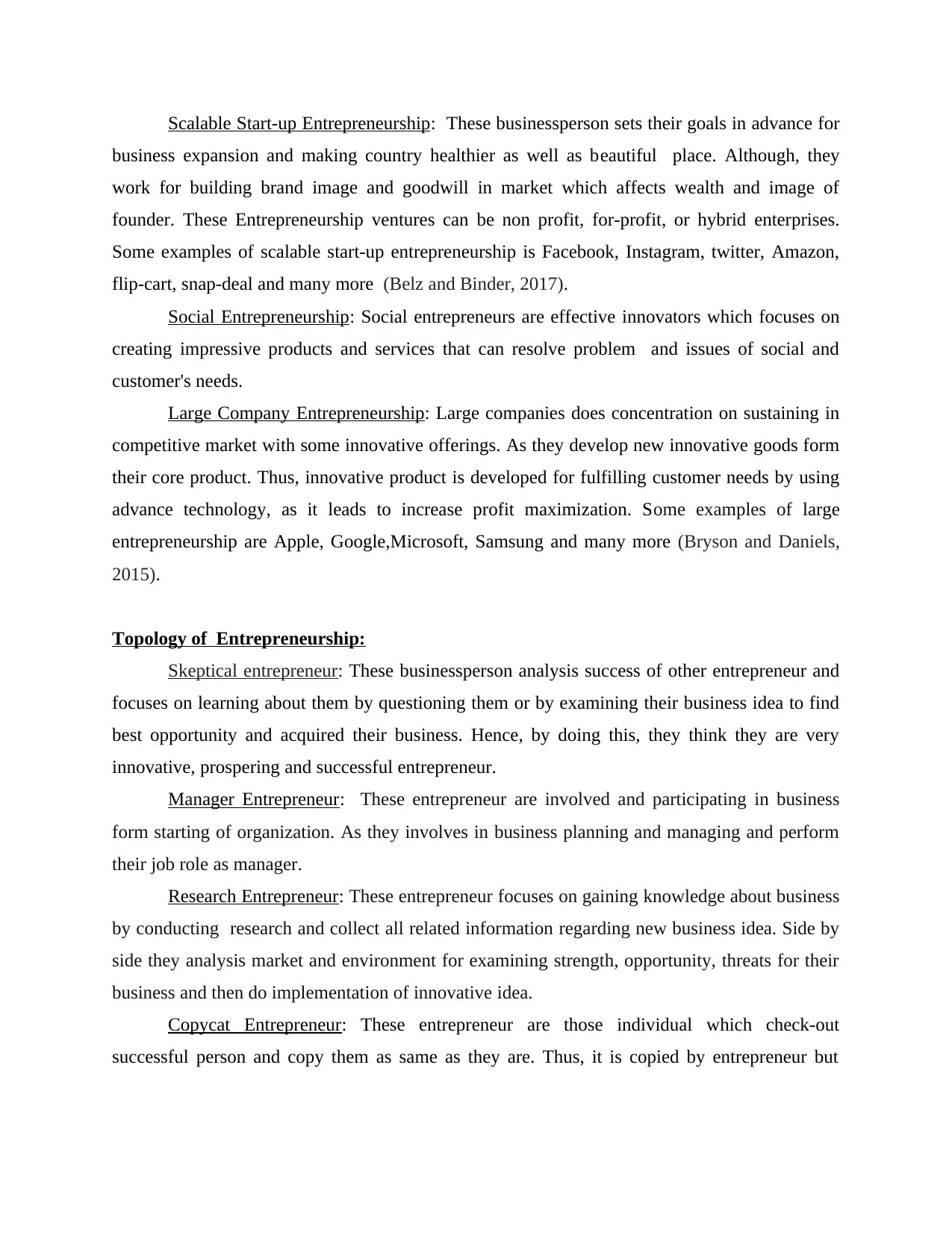
Scalable Start-up Entrepreneurship: These businessperson sets their goals in advance for
business expansion and making country healthier as well as beautiful place. Although, they
work for building brand image and goodwill in market which affects wealth and image of
founder. These Entrepreneurship ventures can be non profit, for-profit, or hybrid enterprises.
Some examples of scalable start-up entrepreneurship is Facebook, Instagram, twitter, Amazon,
flip-cart, snap-deal and many more (Belz and Binder, 2017).
Social Entrepreneurship: Social entrepreneurs are effective innovators which focuses on
creating impressive products and services that can resolve problem and issues of social and
customer's needs.
Large Company Entrepreneurship: Large companies does concentration on sustaining in
competitive market with some innovative offerings. As they develop new innovative goods form
their core product. Thus, innovative product is developed for fulfilling customer needs by using
advance technology, as it leads to increase profit maximization. Some examples of large
entrepreneurship are Apple, Google,Microsoft, Samsung and many more (Bryson and Daniels,
2015).
Topology of Entrepreneurship:
Skeptical entrepreneur: These businessperson analysis success of other entrepreneur and
focuses on learning about them by questioning them or by examining their business idea to find
best opportunity and acquired their business. Hence, by doing this, they think they are very
innovative, prospering and successful entrepreneur.
Manager Entrepreneur: These entrepreneur are involved and participating in business
form starting of organization. As they involves in business planning and managing and perform
their job role as manager.
Research Entrepreneur: These entrepreneur focuses on gaining knowledge about business
by conducting research and collect all related information regarding new business idea. Side by
side they analysis market and environment for examining strength, opportunity, threats for their
business and then do implementation of innovative idea.
Copycat Entrepreneur: These entrepreneur are those individual which check-out
successful person and copy them as same as they are. Thus, it is copied by entrepreneur but
business expansion and making country healthier as well as beautiful place. Although, they
work for building brand image and goodwill in market which affects wealth and image of
founder. These Entrepreneurship ventures can be non profit, for-profit, or hybrid enterprises.
Some examples of scalable start-up entrepreneurship is Facebook, Instagram, twitter, Amazon,
flip-cart, snap-deal and many more (Belz and Binder, 2017).
Social Entrepreneurship: Social entrepreneurs are effective innovators which focuses on
creating impressive products and services that can resolve problem and issues of social and
customer's needs.
Large Company Entrepreneurship: Large companies does concentration on sustaining in
competitive market with some innovative offerings. As they develop new innovative goods form
their core product. Thus, innovative product is developed for fulfilling customer needs by using
advance technology, as it leads to increase profit maximization. Some examples of large
entrepreneurship are Apple, Google,Microsoft, Samsung and many more (Bryson and Daniels,
2015).
Topology of Entrepreneurship:
Skeptical entrepreneur: These businessperson analysis success of other entrepreneur and
focuses on learning about them by questioning them or by examining their business idea to find
best opportunity and acquired their business. Hence, by doing this, they think they are very
innovative, prospering and successful entrepreneur.
Manager Entrepreneur: These entrepreneur are involved and participating in business
form starting of organization. As they involves in business planning and managing and perform
their job role as manager.
Research Entrepreneur: These entrepreneur focuses on gaining knowledge about business
by conducting research and collect all related information regarding new business idea. Side by
side they analysis market and environment for examining strength, opportunity, threats for their
business and then do implementation of innovative idea.
Copycat Entrepreneur: These entrepreneur are those individual which check-out
successful person and copy them as same as they are. Thus, it is copied by entrepreneur but
Paraphrase This Document
Need a fresh take? Get an instant paraphrase of this document with our AI Paraphraser
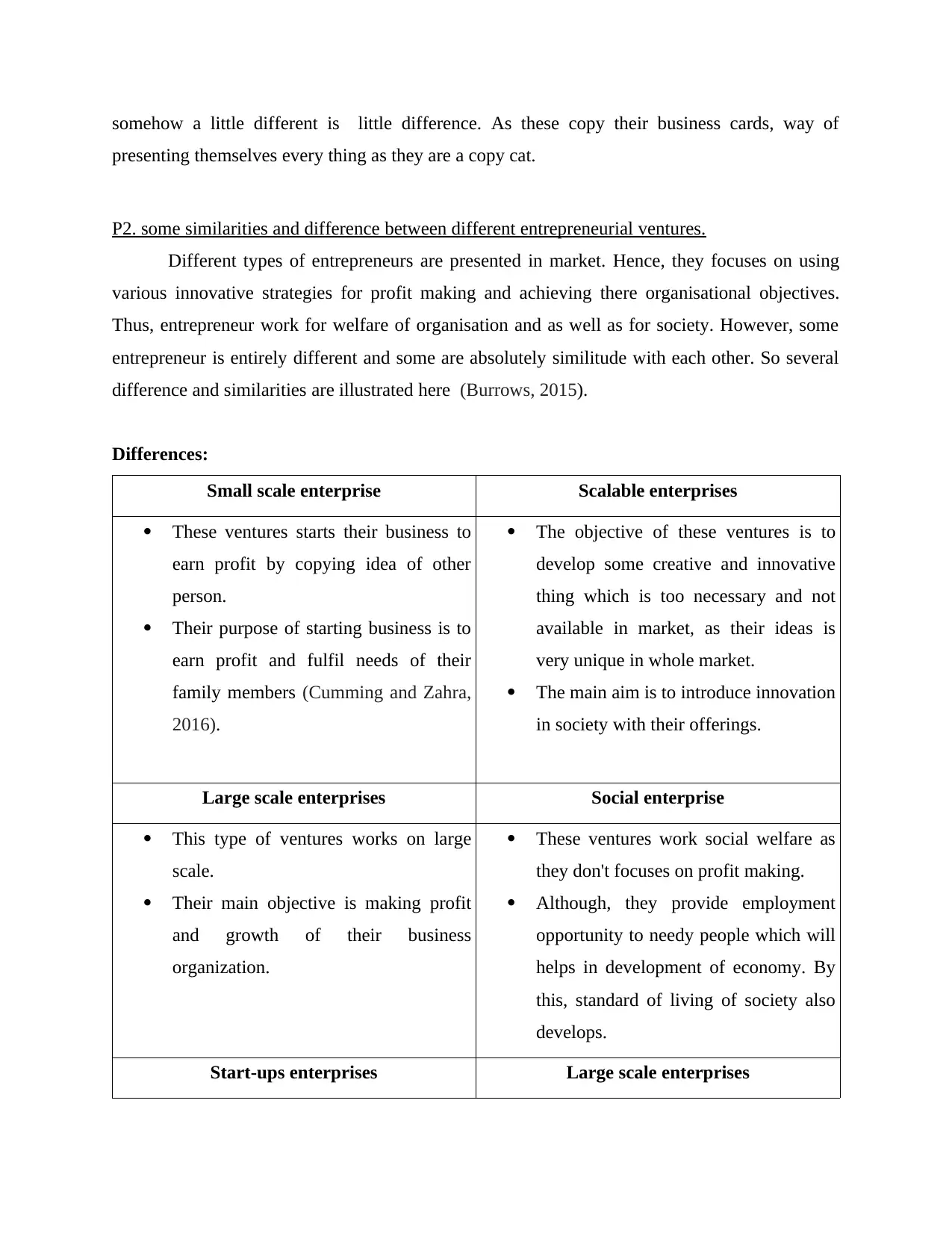
somehow a little different is little difference. As these copy their business cards, way of
presenting themselves every thing as they are a copy cat.
P2. some similarities and difference between different entrepreneurial ventures.
Different types of entrepreneurs are presented in market. Hence, they focuses on using
various innovative strategies for profit making and achieving there organisational objectives.
Thus, entrepreneur work for welfare of organisation and as well as for society. However, some
entrepreneur is entirely different and some are absolutely similitude with each other. So several
difference and similarities are illustrated here (Burrows, 2015).
Differences:
Small scale enterprise Scalable enterprises
These ventures starts their business to
earn profit by copying idea of other
person.
Their purpose of starting business is to
earn profit and fulfil needs of their
family members (Cumming and Zahra,
2016).
The objective of these ventures is to
develop some creative and innovative
thing which is too necessary and not
available in market, as their ideas is
very unique in whole market.
The main aim is to introduce innovation
in society with their offerings.
Large scale enterprises Social enterprise
This type of ventures works on large
scale.
Their main objective is making profit
and growth of their business
organization.
These ventures work social welfare as
they don't focuses on profit making.
Although, they provide employment
opportunity to needy people which will
helps in development of economy. By
this, standard of living of society also
develops.
Start-ups enterprises Large scale enterprises
presenting themselves every thing as they are a copy cat.
P2. some similarities and difference between different entrepreneurial ventures.
Different types of entrepreneurs are presented in market. Hence, they focuses on using
various innovative strategies for profit making and achieving there organisational objectives.
Thus, entrepreneur work for welfare of organisation and as well as for society. However, some
entrepreneur is entirely different and some are absolutely similitude with each other. So several
difference and similarities are illustrated here (Burrows, 2015).
Differences:
Small scale enterprise Scalable enterprises
These ventures starts their business to
earn profit by copying idea of other
person.
Their purpose of starting business is to
earn profit and fulfil needs of their
family members (Cumming and Zahra,
2016).
The objective of these ventures is to
develop some creative and innovative
thing which is too necessary and not
available in market, as their ideas is
very unique in whole market.
The main aim is to introduce innovation
in society with their offerings.
Large scale enterprises Social enterprise
This type of ventures works on large
scale.
Their main objective is making profit
and growth of their business
organization.
These ventures work social welfare as
they don't focuses on profit making.
Although, they provide employment
opportunity to needy people which will
helps in development of economy. By
this, standard of living of society also
develops.
Start-ups enterprises Large scale enterprises
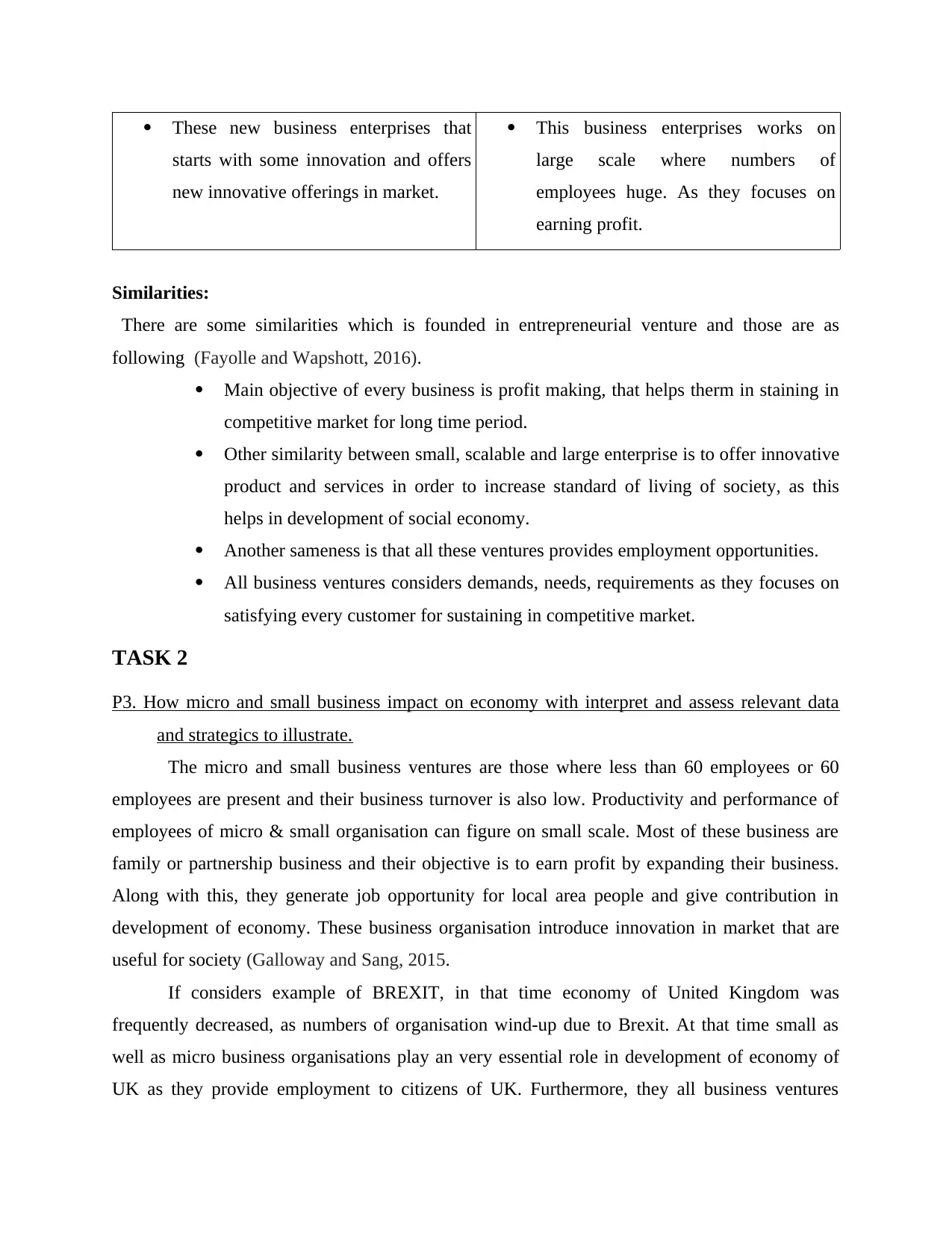
These new business enterprises that
starts with some innovation and offers
new innovative offerings in market.
This business enterprises works on
large scale where numbers of
employees huge. As they focuses on
earning profit.
Similarities:
There are some similarities which is founded in entrepreneurial venture and those are as
following (Fayolle and Wapshott, 2016).
Main objective of every business is profit making, that helps therm in staining in
competitive market for long time period.
Other similarity between small, scalable and large enterprise is to offer innovative
product and services in order to increase standard of living of society, as this
helps in development of social economy.
Another sameness is that all these ventures provides employment opportunities.
All business ventures considers demands, needs, requirements as they focuses on
satisfying every customer for sustaining in competitive market.
TASK 2
P3. How micro and small business impact on economy with interpret and assess relevant data
and strategics to illustrate.
The micro and small business ventures are those where less than 60 employees or 60
employees are present and their business turnover is also low. Productivity and performance of
employees of micro & small organisation can figure on small scale. Most of these business are
family or partnership business and their objective is to earn profit by expanding their business.
Along with this, they generate job opportunity for local area people and give contribution in
development of economy. These business organisation introduce innovation in market that are
useful for society (Galloway and Sang, 2015.
If considers example of BREXIT, in that time economy of United Kingdom was
frequently decreased, as numbers of organisation wind-up due to Brexit. At that time small as
well as micro business organisations play an very essential role in development of economy of
UK as they provide employment to citizens of UK. Furthermore, they all business ventures
starts with some innovation and offers
new innovative offerings in market.
This business enterprises works on
large scale where numbers of
employees huge. As they focuses on
earning profit.
Similarities:
There are some similarities which is founded in entrepreneurial venture and those are as
following (Fayolle and Wapshott, 2016).
Main objective of every business is profit making, that helps therm in staining in
competitive market for long time period.
Other similarity between small, scalable and large enterprise is to offer innovative
product and services in order to increase standard of living of society, as this
helps in development of social economy.
Another sameness is that all these ventures provides employment opportunities.
All business ventures considers demands, needs, requirements as they focuses on
satisfying every customer for sustaining in competitive market.
TASK 2
P3. How micro and small business impact on economy with interpret and assess relevant data
and strategics to illustrate.
The micro and small business ventures are those where less than 60 employees or 60
employees are present and their business turnover is also low. Productivity and performance of
employees of micro & small organisation can figure on small scale. Most of these business are
family or partnership business and their objective is to earn profit by expanding their business.
Along with this, they generate job opportunity for local area people and give contribution in
development of economy. These business organisation introduce innovation in market that are
useful for society (Galloway and Sang, 2015.
If considers example of BREXIT, in that time economy of United Kingdom was
frequently decreased, as numbers of organisation wind-up due to Brexit. At that time small as
well as micro business organisations play an very essential role in development of economy of
UK as they provide employment to citizens of UK. Furthermore, they all business ventures
⊘ This is a preview!⊘
Do you want full access?
Subscribe today to unlock all pages.

Trusted by 1+ million students worldwide
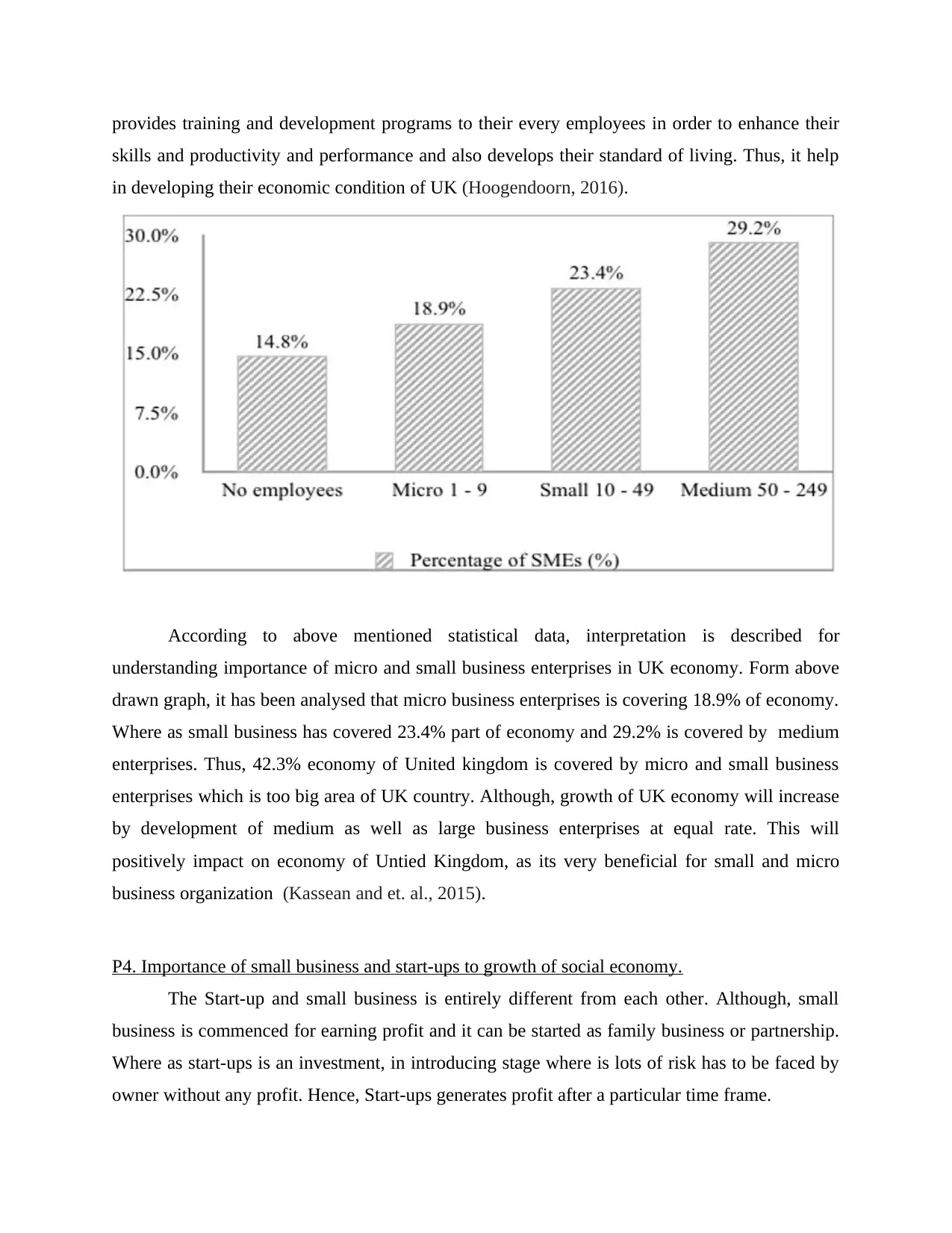
provides training and development programs to their every employees in order to enhance their
skills and productivity and performance and also develops their standard of living. Thus, it help
in developing their economic condition of UK (Hoogendoorn, 2016).
According to above mentioned statistical data, interpretation is described for
understanding importance of micro and small business enterprises in UK economy. Form above
drawn graph, it has been analysed that micro business enterprises is covering 18.9% of economy.
Where as small business has covered 23.4% part of economy and 29.2% is covered by medium
enterprises. Thus, 42.3% economy of United kingdom is covered by micro and small business
enterprises which is too big area of UK country. Although, growth of UK economy will increase
by development of medium as well as large business enterprises at equal rate. This will
positively impact on economy of Untied Kingdom, as its very beneficial for small and micro
business organization (Kassean and et. al., 2015).
P4. Importance of small business and start-ups to growth of social economy.
The Start-up and small business is entirely different from each other. Although, small
business is commenced for earning profit and it can be started as family business or partnership.
Where as start-ups is an investment, in introducing stage where is lots of risk has to be faced by
owner without any profit. Hence, Start-ups generates profit after a particular time frame.
skills and productivity and performance and also develops their standard of living. Thus, it help
in developing their economic condition of UK (Hoogendoorn, 2016).
According to above mentioned statistical data, interpretation is described for
understanding importance of micro and small business enterprises in UK economy. Form above
drawn graph, it has been analysed that micro business enterprises is covering 18.9% of economy.
Where as small business has covered 23.4% part of economy and 29.2% is covered by medium
enterprises. Thus, 42.3% economy of United kingdom is covered by micro and small business
enterprises which is too big area of UK country. Although, growth of UK economy will increase
by development of medium as well as large business enterprises at equal rate. This will
positively impact on economy of Untied Kingdom, as its very beneficial for small and micro
business organization (Kassean and et. al., 2015).
P4. Importance of small business and start-ups to growth of social economy.
The Start-up and small business is entirely different from each other. Although, small
business is commenced for earning profit and it can be started as family business or partnership.
Where as start-ups is an investment, in introducing stage where is lots of risk has to be faced by
owner without any profit. Hence, Start-ups generates profit after a particular time frame.
Paraphrase This Document
Need a fresh take? Get an instant paraphrase of this document with our AI Paraphraser
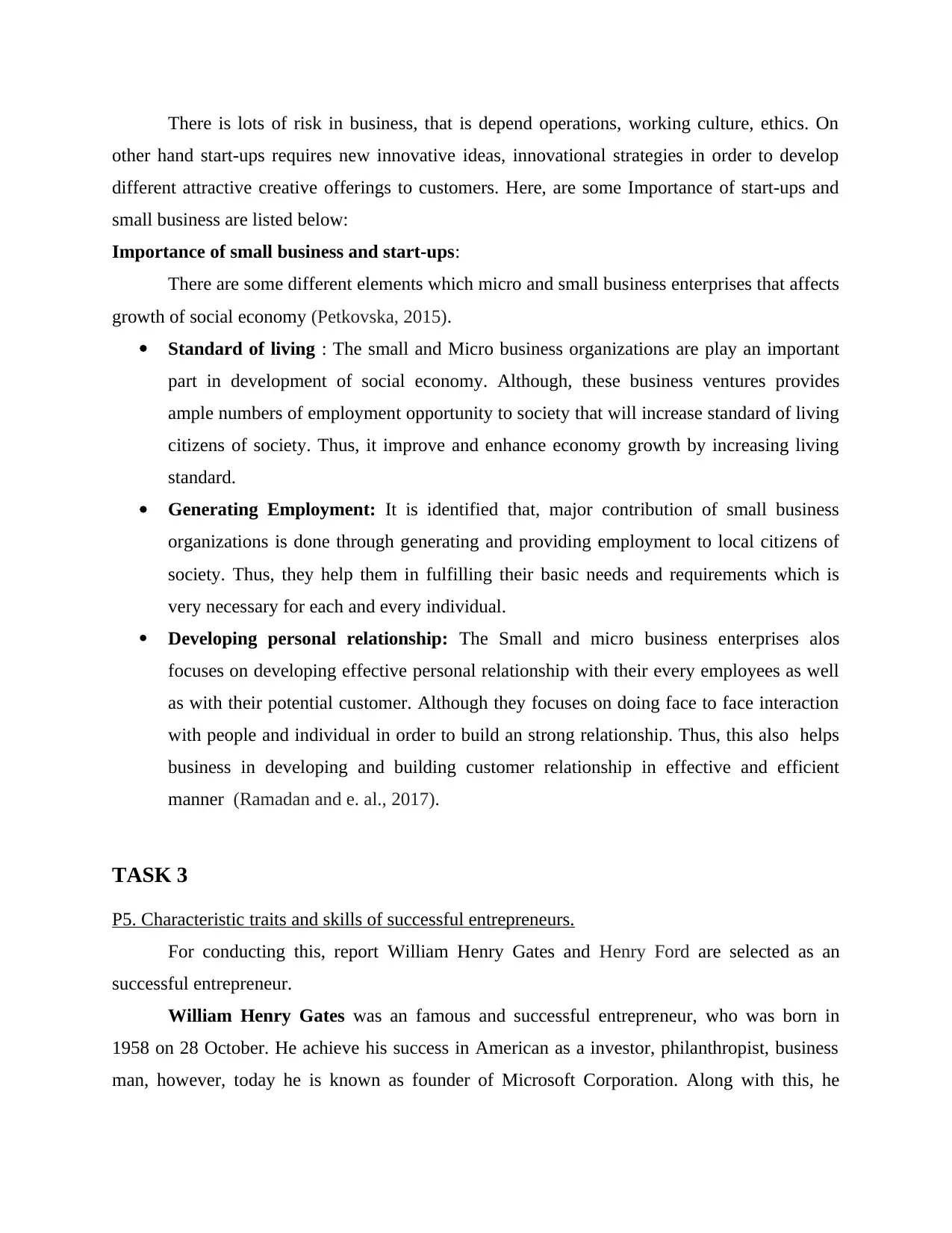
There is lots of risk in business, that is depend operations, working culture, ethics. On
other hand start-ups requires new innovative ideas, innovational strategies in order to develop
different attractive creative offerings to customers. Here, are some Importance of start-ups and
small business are listed below:
Importance of small business and start-ups:
There are some different elements which micro and small business enterprises that affects
growth of social economy (Petkovska, 2015).
Standard of living : The small and Micro business organizations are play an important
part in development of social economy. Although, these business ventures provides
ample numbers of employment opportunity to society that will increase standard of living
citizens of society. Thus, it improve and enhance economy growth by increasing living
standard.
Generating Employment: It is identified that, major contribution of small business
organizations is done through generating and providing employment to local citizens of
society. Thus, they help them in fulfilling their basic needs and requirements which is
very necessary for each and every individual.
Developing personal relationship: The Small and micro business enterprises alos
focuses on developing effective personal relationship with their every employees as well
as with their potential customer. Although they focuses on doing face to face interaction
with people and individual in order to build an strong relationship. Thus, this also helps
business in developing and building customer relationship in effective and efficient
manner (Ramadan and e. al., 2017).
TASK 3
P5. Characteristic traits and skills of successful entrepreneurs.
For conducting this, report William Henry Gates and Henry Ford are selected as an
successful entrepreneur.
William Henry Gates was an famous and successful entrepreneur, who was born in
1958 on 28 October. He achieve his success in American as a investor, philanthropist, business
man, however, today he is known as founder of Microsoft Corporation. Along with this, he
other hand start-ups requires new innovative ideas, innovational strategies in order to develop
different attractive creative offerings to customers. Here, are some Importance of start-ups and
small business are listed below:
Importance of small business and start-ups:
There are some different elements which micro and small business enterprises that affects
growth of social economy (Petkovska, 2015).
Standard of living : The small and Micro business organizations are play an important
part in development of social economy. Although, these business ventures provides
ample numbers of employment opportunity to society that will increase standard of living
citizens of society. Thus, it improve and enhance economy growth by increasing living
standard.
Generating Employment: It is identified that, major contribution of small business
organizations is done through generating and providing employment to local citizens of
society. Thus, they help them in fulfilling their basic needs and requirements which is
very necessary for each and every individual.
Developing personal relationship: The Small and micro business enterprises alos
focuses on developing effective personal relationship with their every employees as well
as with their potential customer. Although they focuses on doing face to face interaction
with people and individual in order to build an strong relationship. Thus, this also helps
business in developing and building customer relationship in effective and efficient
manner (Ramadan and e. al., 2017).
TASK 3
P5. Characteristic traits and skills of successful entrepreneurs.
For conducting this, report William Henry Gates and Henry Ford are selected as an
successful entrepreneur.
William Henry Gates was an famous and successful entrepreneur, who was born in
1958 on 28 October. He achieve his success in American as a investor, philanthropist, business
man, however, today he is known as founder of Microsoft Corporation. Along with this, he
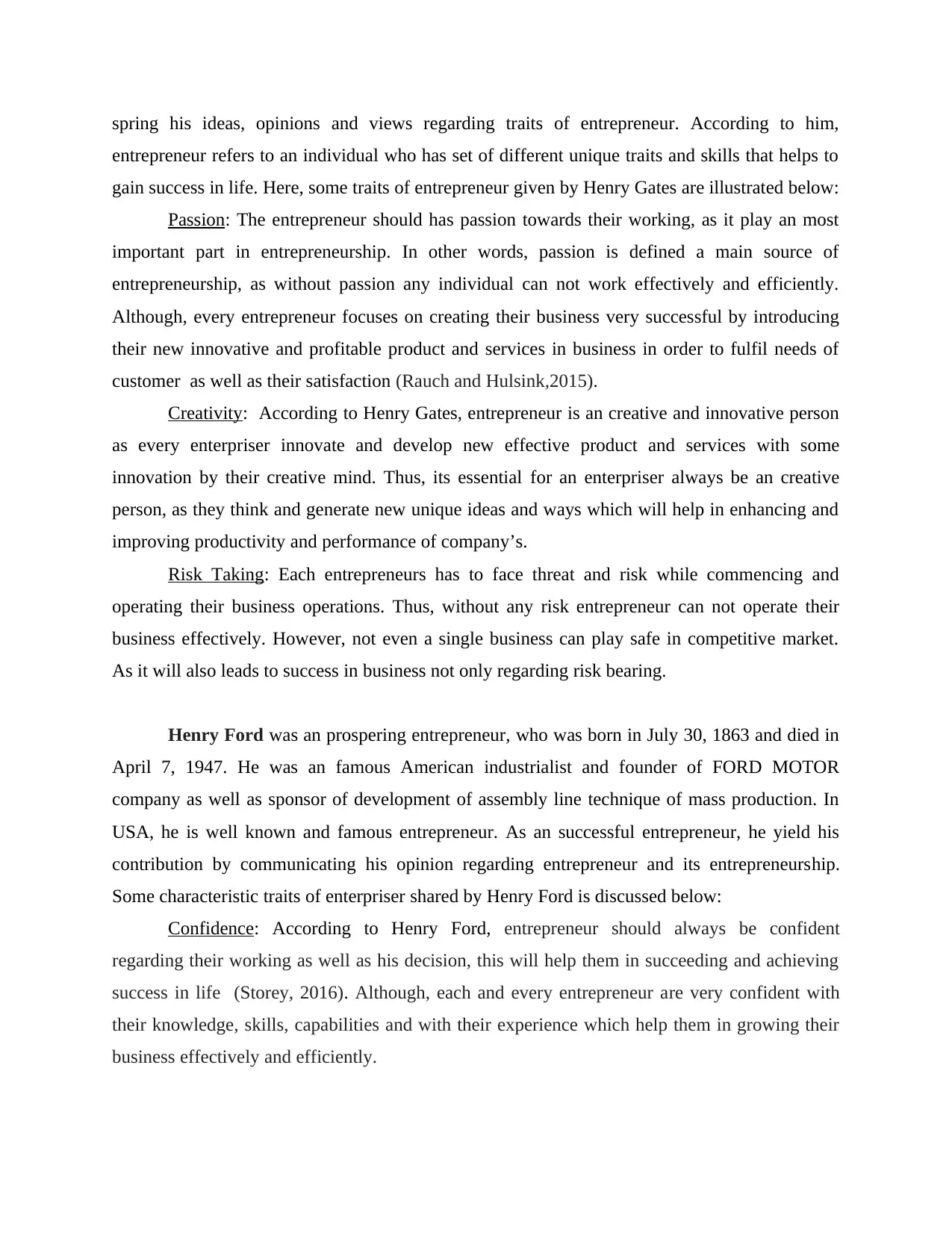
spring his ideas, opinions and views regarding traits of entrepreneur. According to him,
entrepreneur refers to an individual who has set of different unique traits and skills that helps to
gain success in life. Here, some traits of entrepreneur given by Henry Gates are illustrated below:
Passion: The entrepreneur should has passion towards their working, as it play an most
important part in entrepreneurship. In other words, passion is defined a main source of
entrepreneurship, as without passion any individual can not work effectively and efficiently.
Although, every entrepreneur focuses on creating their business very successful by introducing
their new innovative and profitable product and services in business in order to fulfil needs of
customer as well as their satisfaction (Rauch and Hulsink,2015).
Creativity: According to Henry Gates, entrepreneur is an creative and innovative person
as every enterpriser innovate and develop new effective product and services with some
innovation by their creative mind. Thus, its essential for an enterpriser always be an creative
person, as they think and generate new unique ideas and ways which will help in enhancing and
improving productivity and performance of company’s.
Risk Taking: Each entrepreneurs has to face threat and risk while commencing and
operating their business operations. Thus, without any risk entrepreneur can not operate their
business effectively. However, not even a single business can play safe in competitive market.
As it will also leads to success in business not only regarding risk bearing.
Henry Ford was an prospering entrepreneur, who was born in July 30, 1863 and died in
April 7, 1947. He was an famous American industrialist and founder of FORD MOTOR
company as well as sponsor of development of assembly line technique of mass production. In
USA, he is well known and famous entrepreneur. As an successful entrepreneur, he yield his
contribution by communicating his opinion regarding entrepreneur and its entrepreneurship.
Some characteristic traits of enterpriser shared by Henry Ford is discussed below:
Confidence: According to Henry Ford, entrepreneur should always be confident
regarding their working as well as his decision, this will help them in succeeding and achieving
success in life (Storey, 2016). Although, each and every entrepreneur are very confident with
their knowledge, skills, capabilities and with their experience which help them in growing their
business effectively and efficiently.
entrepreneur refers to an individual who has set of different unique traits and skills that helps to
gain success in life. Here, some traits of entrepreneur given by Henry Gates are illustrated below:
Passion: The entrepreneur should has passion towards their working, as it play an most
important part in entrepreneurship. In other words, passion is defined a main source of
entrepreneurship, as without passion any individual can not work effectively and efficiently.
Although, every entrepreneur focuses on creating their business very successful by introducing
their new innovative and profitable product and services in business in order to fulfil needs of
customer as well as their satisfaction (Rauch and Hulsink,2015).
Creativity: According to Henry Gates, entrepreneur is an creative and innovative person
as every enterpriser innovate and develop new effective product and services with some
innovation by their creative mind. Thus, its essential for an enterpriser always be an creative
person, as they think and generate new unique ideas and ways which will help in enhancing and
improving productivity and performance of company’s.
Risk Taking: Each entrepreneurs has to face threat and risk while commencing and
operating their business operations. Thus, without any risk entrepreneur can not operate their
business effectively. However, not even a single business can play safe in competitive market.
As it will also leads to success in business not only regarding risk bearing.
Henry Ford was an prospering entrepreneur, who was born in July 30, 1863 and died in
April 7, 1947. He was an famous American industrialist and founder of FORD MOTOR
company as well as sponsor of development of assembly line technique of mass production. In
USA, he is well known and famous entrepreneur. As an successful entrepreneur, he yield his
contribution by communicating his opinion regarding entrepreneur and its entrepreneurship.
Some characteristic traits of enterpriser shared by Henry Ford is discussed below:
Confidence: According to Henry Ford, entrepreneur should always be confident
regarding their working as well as his decision, this will help them in succeeding and achieving
success in life (Storey, 2016). Although, each and every entrepreneur are very confident with
their knowledge, skills, capabilities and with their experience which help them in growing their
business effectively and efficiently.
⊘ This is a preview!⊘
Do you want full access?
Subscribe today to unlock all pages.

Trusted by 1+ million students worldwide
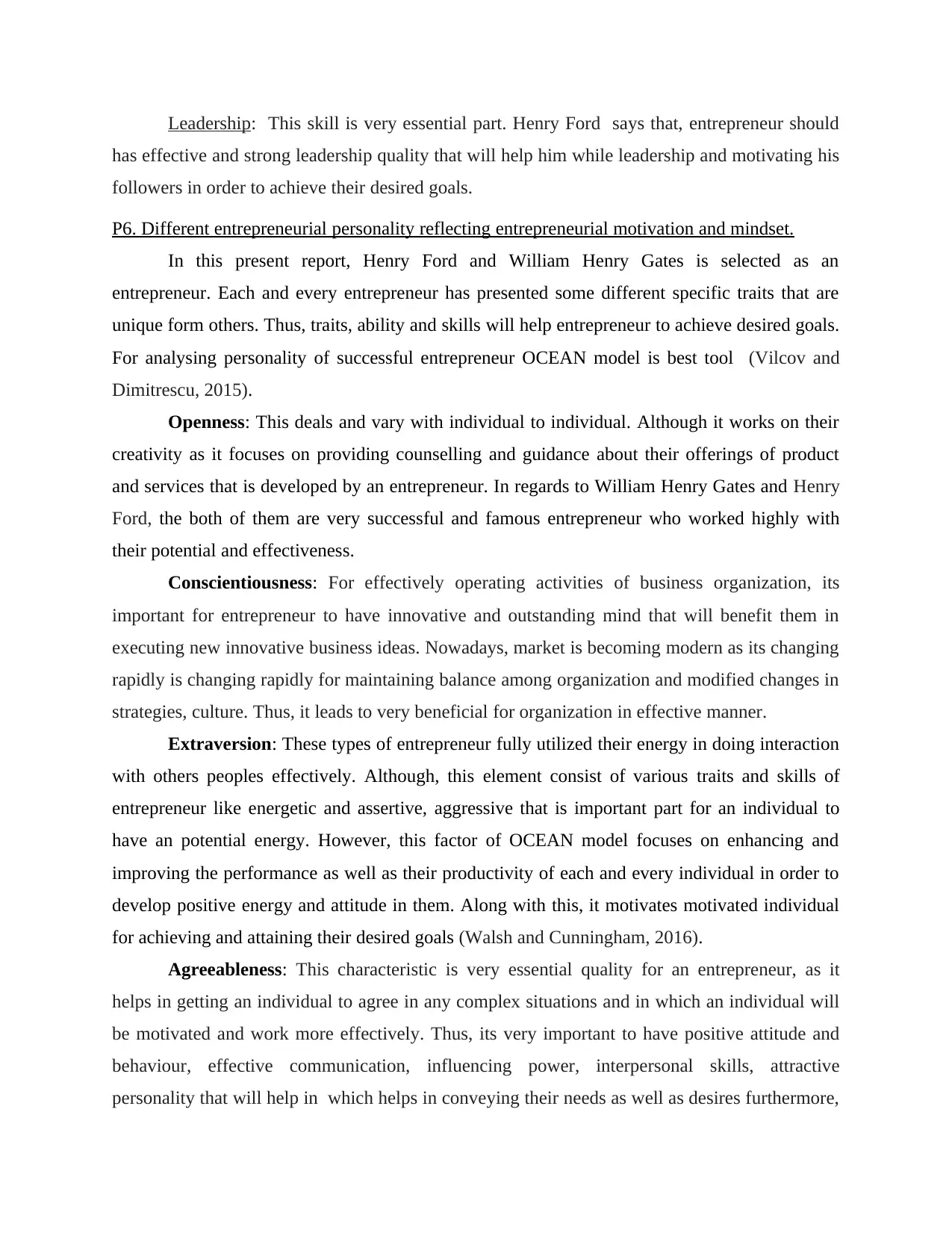
Leadership: This skill is very essential part. Henry Ford says that, entrepreneur should
has effective and strong leadership quality that will help him while leadership and motivating his
followers in order to achieve their desired goals.
P6. Different entrepreneurial personality reflecting entrepreneurial motivation and mindset.
In this present report, Henry Ford and William Henry Gates is selected as an
entrepreneur. Each and every entrepreneur has presented some different specific traits that are
unique form others. Thus, traits, ability and skills will help entrepreneur to achieve desired goals.
For analysing personality of successful entrepreneur OCEAN model is best tool (Vilcov and
Dimitrescu, 2015).
Openness: This deals and vary with individual to individual. Although it works on their
creativity as it focuses on providing counselling and guidance about their offerings of product
and services that is developed by an entrepreneur. In regards to William Henry Gates and Henry
Ford, the both of them are very successful and famous entrepreneur who worked highly with
their potential and effectiveness.
Conscientiousness: For effectively operating activities of business organization, its
important for entrepreneur to have innovative and outstanding mind that will benefit them in
executing new innovative business ideas. Nowadays, market is becoming modern as its changing
rapidly is changing rapidly for maintaining balance among organization and modified changes in
strategies, culture. Thus, it leads to very beneficial for organization in effective manner.
Extraversion: These types of entrepreneur fully utilized their energy in doing interaction
with others peoples effectively. Although, this element consist of various traits and skills of
entrepreneur like energetic and assertive, aggressive that is important part for an individual to
have an potential energy. However, this factor of OCEAN model focuses on enhancing and
improving the performance as well as their productivity of each and every individual in order to
develop positive energy and attitude in them. Along with this, it motivates motivated individual
for achieving and attaining their desired goals (Walsh and Cunningham, 2016).
Agreeableness: This characteristic is very essential quality for an entrepreneur, as it
helps in getting an individual to agree in any complex situations and in which an individual will
be motivated and work more effectively. Thus, its very important to have positive attitude and
behaviour, effective communication, influencing power, interpersonal skills, attractive
personality that will help in which helps in conveying their needs as well as desires furthermore,
has effective and strong leadership quality that will help him while leadership and motivating his
followers in order to achieve their desired goals.
P6. Different entrepreneurial personality reflecting entrepreneurial motivation and mindset.
In this present report, Henry Ford and William Henry Gates is selected as an
entrepreneur. Each and every entrepreneur has presented some different specific traits that are
unique form others. Thus, traits, ability and skills will help entrepreneur to achieve desired goals.
For analysing personality of successful entrepreneur OCEAN model is best tool (Vilcov and
Dimitrescu, 2015).
Openness: This deals and vary with individual to individual. Although it works on their
creativity as it focuses on providing counselling and guidance about their offerings of product
and services that is developed by an entrepreneur. In regards to William Henry Gates and Henry
Ford, the both of them are very successful and famous entrepreneur who worked highly with
their potential and effectiveness.
Conscientiousness: For effectively operating activities of business organization, its
important for entrepreneur to have innovative and outstanding mind that will benefit them in
executing new innovative business ideas. Nowadays, market is becoming modern as its changing
rapidly is changing rapidly for maintaining balance among organization and modified changes in
strategies, culture. Thus, it leads to very beneficial for organization in effective manner.
Extraversion: These types of entrepreneur fully utilized their energy in doing interaction
with others peoples effectively. Although, this element consist of various traits and skills of
entrepreneur like energetic and assertive, aggressive that is important part for an individual to
have an potential energy. However, this factor of OCEAN model focuses on enhancing and
improving the performance as well as their productivity of each and every individual in order to
develop positive energy and attitude in them. Along with this, it motivates motivated individual
for achieving and attaining their desired goals (Walsh and Cunningham, 2016).
Agreeableness: This characteristic is very essential quality for an entrepreneur, as it
helps in getting an individual to agree in any complex situations and in which an individual will
be motivated and work more effectively. Thus, its very important to have positive attitude and
behaviour, effective communication, influencing power, interpersonal skills, attractive
personality that will help in which helps in conveying their needs as well as desires furthermore,
Paraphrase This Document
Need a fresh take? Get an instant paraphrase of this document with our AI Paraphraser
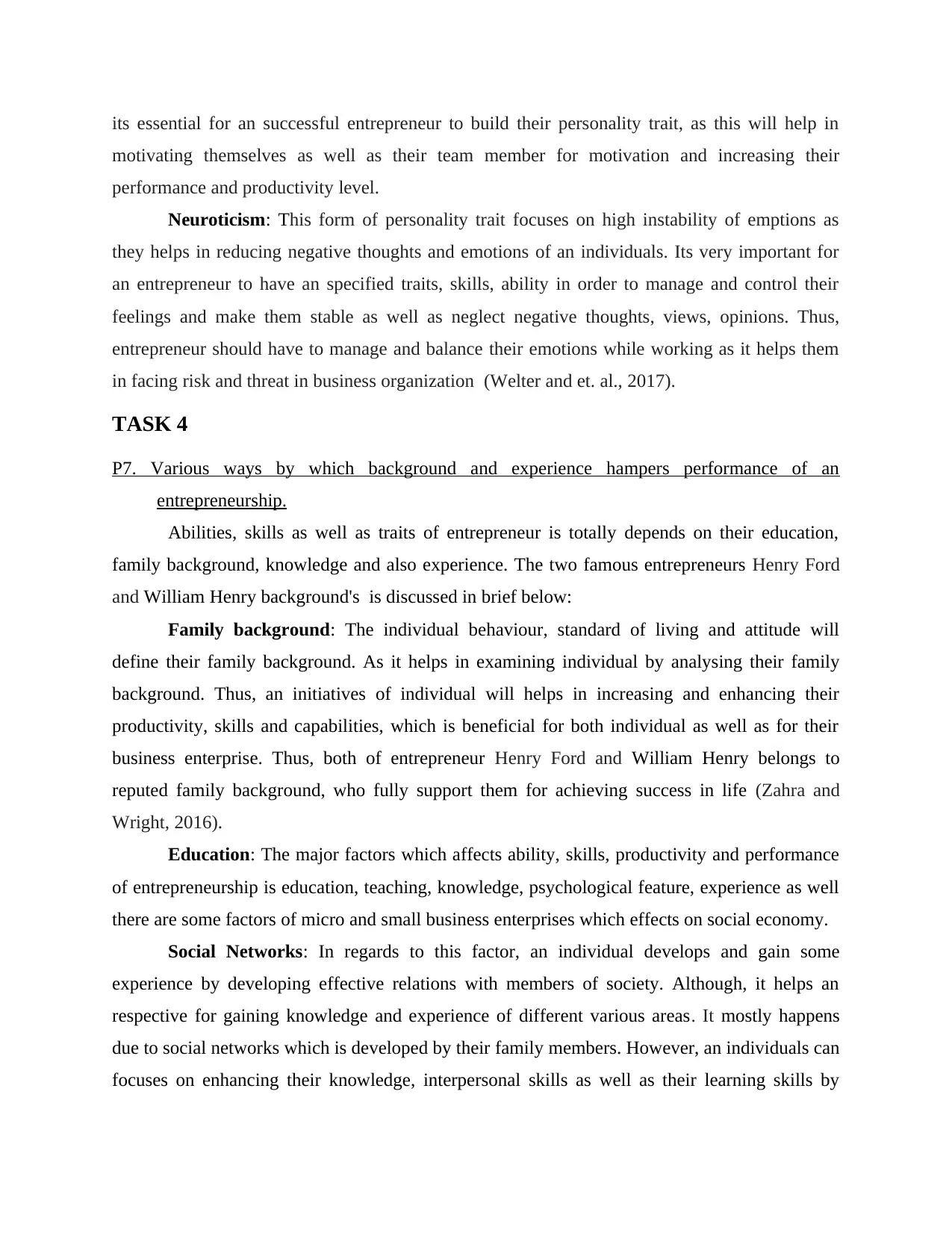
its essential for an successful entrepreneur to build their personality trait, as this will help in
motivating themselves as well as their team member for motivation and increasing their
performance and productivity level.
Neuroticism: This form of personality trait focuses on high instability of emptions as
they helps in reducing negative thoughts and emotions of an individuals. Its very important for
an entrepreneur to have an specified traits, skills, ability in order to manage and control their
feelings and make them stable as well as neglect negative thoughts, views, opinions. Thus,
entrepreneur should have to manage and balance their emotions while working as it helps them
in facing risk and threat in business organization (Welter and et. al., 2017).
TASK 4
P7. Various ways by which background and experience hampers performance of an
entrepreneurship.
Abilities, skills as well as traits of entrepreneur is totally depends on their education,
family background, knowledge and also experience. The two famous entrepreneurs Henry Ford
and William Henry background's is discussed in brief below:
Family background: The individual behaviour, standard of living and attitude will
define their family background. As it helps in examining individual by analysing their family
background. Thus, an initiatives of individual will helps in increasing and enhancing their
productivity, skills and capabilities, which is beneficial for both individual as well as for their
business enterprise. Thus, both of entrepreneur Henry Ford and William Henry belongs to
reputed family background, who fully support them for achieving success in life (Zahra and
Wright, 2016).
Education: The major factors which affects ability, skills, productivity and performance
of entrepreneurship is education, teaching, knowledge, psychological feature, experience as well
there are some factors of micro and small business enterprises which effects on social economy.
Social Networks: In regards to this factor, an individual develops and gain some
experience by developing effective relations with members of society. Although, it helps an
respective for gaining knowledge and experience of different various areas. It mostly happens
due to social networks which is developed by their family members. However, an individuals can
focuses on enhancing their knowledge, interpersonal skills as well as their learning skills by
motivating themselves as well as their team member for motivation and increasing their
performance and productivity level.
Neuroticism: This form of personality trait focuses on high instability of emptions as
they helps in reducing negative thoughts and emotions of an individuals. Its very important for
an entrepreneur to have an specified traits, skills, ability in order to manage and control their
feelings and make them stable as well as neglect negative thoughts, views, opinions. Thus,
entrepreneur should have to manage and balance their emotions while working as it helps them
in facing risk and threat in business organization (Welter and et. al., 2017).
TASK 4
P7. Various ways by which background and experience hampers performance of an
entrepreneurship.
Abilities, skills as well as traits of entrepreneur is totally depends on their education,
family background, knowledge and also experience. The two famous entrepreneurs Henry Ford
and William Henry background's is discussed in brief below:
Family background: The individual behaviour, standard of living and attitude will
define their family background. As it helps in examining individual by analysing their family
background. Thus, an initiatives of individual will helps in increasing and enhancing their
productivity, skills and capabilities, which is beneficial for both individual as well as for their
business enterprise. Thus, both of entrepreneur Henry Ford and William Henry belongs to
reputed family background, who fully support them for achieving success in life (Zahra and
Wright, 2016).
Education: The major factors which affects ability, skills, productivity and performance
of entrepreneurship is education, teaching, knowledge, psychological feature, experience as well
there are some factors of micro and small business enterprises which effects on social economy.
Social Networks: In regards to this factor, an individual develops and gain some
experience by developing effective relations with members of society. Although, it helps an
respective for gaining knowledge and experience of different various areas. It mostly happens
due to social networks which is developed by their family members. However, an individuals can
focuses on enhancing their knowledge, interpersonal skills as well as their learning skills by
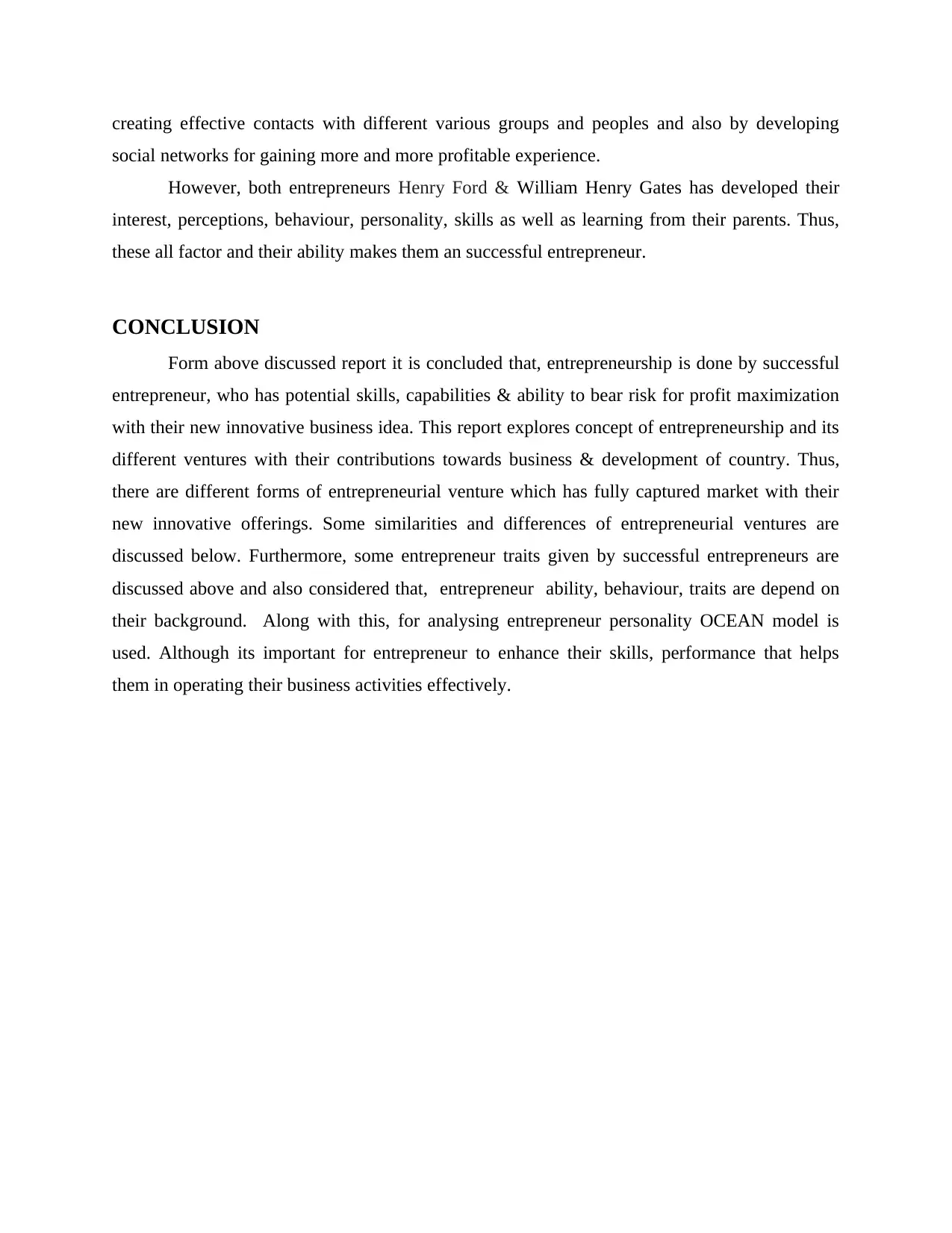
creating effective contacts with different various groups and peoples and also by developing
social networks for gaining more and more profitable experience.
However, both entrepreneurs Henry Ford & William Henry Gates has developed their
interest, perceptions, behaviour, personality, skills as well as learning from their parents. Thus,
these all factor and their ability makes them an successful entrepreneur.
CONCLUSION
Form above discussed report it is concluded that, entrepreneurship is done by successful
entrepreneur, who has potential skills, capabilities & ability to bear risk for profit maximization
with their new innovative business idea. This report explores concept of entrepreneurship and its
different ventures with their contributions towards business & development of country. Thus,
there are different forms of entrepreneurial venture which has fully captured market with their
new innovative offerings. Some similarities and differences of entrepreneurial ventures are
discussed below. Furthermore, some entrepreneur traits given by successful entrepreneurs are
discussed above and also considered that, entrepreneur ability, behaviour, traits are depend on
their background. Along with this, for analysing entrepreneur personality OCEAN model is
used. Although its important for entrepreneur to enhance their skills, performance that helps
them in operating their business activities effectively.
social networks for gaining more and more profitable experience.
However, both entrepreneurs Henry Ford & William Henry Gates has developed their
interest, perceptions, behaviour, personality, skills as well as learning from their parents. Thus,
these all factor and their ability makes them an successful entrepreneur.
CONCLUSION
Form above discussed report it is concluded that, entrepreneurship is done by successful
entrepreneur, who has potential skills, capabilities & ability to bear risk for profit maximization
with their new innovative business idea. This report explores concept of entrepreneurship and its
different ventures with their contributions towards business & development of country. Thus,
there are different forms of entrepreneurial venture which has fully captured market with their
new innovative offerings. Some similarities and differences of entrepreneurial ventures are
discussed below. Furthermore, some entrepreneur traits given by successful entrepreneurs are
discussed above and also considered that, entrepreneur ability, behaviour, traits are depend on
their background. Along with this, for analysing entrepreneur personality OCEAN model is
used. Although its important for entrepreneur to enhance their skills, performance that helps
them in operating their business activities effectively.
⊘ This is a preview!⊘
Do you want full access?
Subscribe today to unlock all pages.

Trusted by 1+ million students worldwide
1 out of 15
Related Documents
Your All-in-One AI-Powered Toolkit for Academic Success.
+13062052269
info@desklib.com
Available 24*7 on WhatsApp / Email
![[object Object]](/_next/static/media/star-bottom.7253800d.svg)
Unlock your academic potential
Copyright © 2020–2026 A2Z Services. All Rights Reserved. Developed and managed by ZUCOL.




